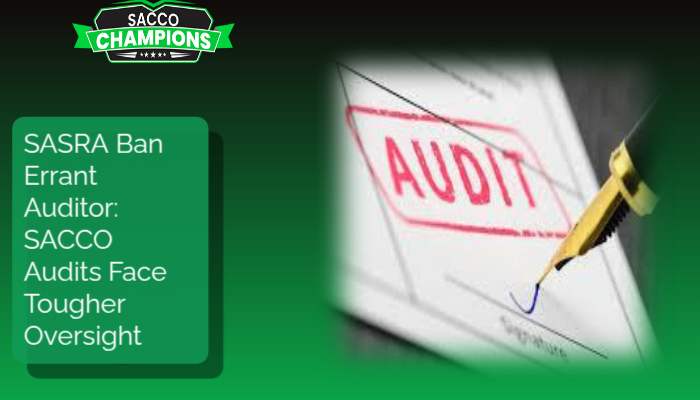SASRA ban errant auditors marks a decisive step by Kenya’s Sacco Societies Regulatory Authority to tighten financial oversight across the cooperative sector. The regulator has issued a strong warning to external auditors who fail to deliver statutory audit reports on time. According to SASRA, repeated delays or non-submission will now lead to permanent disqualification from auditing SACCOs. This bold move seeks to uphold financial discipline, protect members’ savings, and promote transparency within Kenya’s rapidly growing SACCO industry.
SASRA Bans Errant Auditors to Enforce Accountability
The SASRA ban on errant auditors’ notices highlights increasing regulatory pressure. Many auditors have missed deadlines to file statutory audit reports within the required four months after the financial year ends.
This failure violates the Sacco Societies Act, which obliges all SACCOs to submit reports on time. SASRA now plans to permanently remove repeat offenders from its approved list of auditors.
This decision aims to strengthen compliance in the cooperative movement and ensure all SACCOs operate under clear financial discipline.
For a detailed understanding of how SACCOs should report and manage finances, explore this guide: Sacco Financial Management and Reporting.
Triggers of SASRA Ban Errant Auditors
SASRA identified two main reasons for disciplinary action:
-
Not submitting the mandatory audit report at all.
-
Submitting the report late—beyond the four-month window.
Auditors who default must comply within a 30-day grace period or face permanent removal. This ensures SACCOs maintain accurate and timely financial records for regulatory review.
You may also like: Building Positive Workplace Culture Training
Governance and Transparency Reforms
The SASRA ban errant auditors initiative aligns with ongoing reforms to improve SACCO governance. Past investigations exposed financial irregularities within some cooperatives, highlighting the need for tighter controls.
By demanding punctual and accurate audit reporting, SASRA aims to restore public confidence in the sector. Collaboration with the Institute of Certified Public Accountants of Kenya (ICPAK) also ensures professional accountability among auditors.
How SACCOs and Auditors Can Stay Compliant
To avoid sanctions, auditors must:
-
Submit reports on time, within four months of financial year-end.
-
Correct any delays within the 30-day grace period.
-
Follow SASRA reporting standards and maintain professional ethics.
Meanwhile, SACCOs should ensure they appoint qualified auditors during AGMs and monitor submission timelines closely.
Conclusion: SASRA’s Firm Stance on Accountability
The SASRA ban errant auditors’ move represents a turning point in SACCO regulation. Auditors who ignore timelines risk losing their approval permanently. This will encourage discipline, transparency, and accountability in Kenya’s cooperative sector.
For SACCOs and auditors seeking guidance and industry insights, visit Sacco Champions, a reliable platform for cooperative news and updates.
SASRA’s decision is not just a warning—it’s a bold step toward safeguarding Kenya’s SACCO ecosystem for future growth and integrity.
Enquire/Request Quote Here

